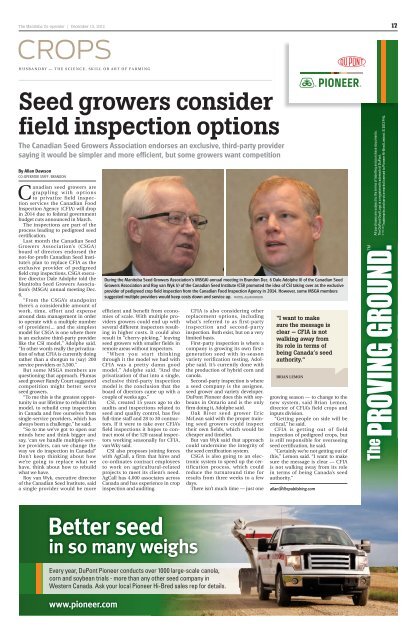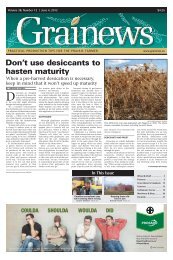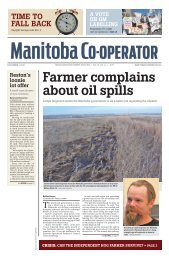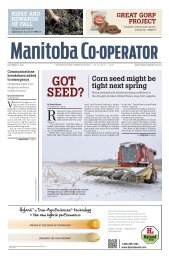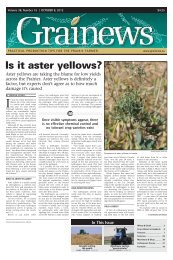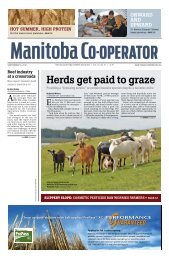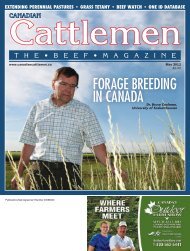National exposé is not a balanced view: MPC
National exposé is not a balanced view: MPC
National exposé is not a balanced view: MPC
You also want an ePaper? Increase the reach of your titles
YUMPU automatically turns print PDFs into web optimized ePapers that Google loves.
The Manitoba Co-operator | December 13, 2012 17<br />
CROPS<br />
H U S B A N D R Y — T H E S C I E N C E , S K I L L O R A R T O F F A R M I N G<br />
Seed growers consider<br />
field inspection options<br />
The Canadian Seed Growers Association endorses an exclusive, third-party provider<br />
saying it would be simpler and more efficient, but some growers want competition<br />
By Allan Dawson<br />
CO-OPERATOR STAFF /BRANDON<br />
Canadian seed growers are<br />
grappling with options<br />
to privatize field inspection<br />
services the Canadian Food<br />
Inspection Agency (CFIA) will drop<br />
in 2014 due to federal government<br />
budget cuts announced in March.<br />
The inspections are part of the<br />
process leading to pedigreed seed<br />
certification.<br />
Last month the Canadian Seed<br />
Growers Association’s (CSGA)<br />
board of directors endorsed the<br />
<strong>not</strong>-for-profit Canadian Seed Institute’s<br />
plan to replace CFIA as the<br />
exclusive provider of pedigreed<br />
field crop inspections, CSGA executive<br />
director Dale Adolphe told the<br />
Manitoba Seed Growers Association’s<br />
(MSGA) annual meeting Dec.<br />
6.<br />
“From the CSGA’s standpoint<br />
there’s a considerable amount of<br />
work, time, effort and expense<br />
around data management in order<br />
to operate with a multiple number<br />
of (providers)... and the simplest<br />
model for CSGA <strong>is</strong> one where there<br />
<strong>is</strong> an exclusive third-party provider<br />
like the CSI model,” Adolphe said.<br />
“In other words really the privatization<br />
of what CFIA <strong>is</strong> currently doing<br />
rather than a shotgun to (say) 200<br />
service providers or 3,500.”<br />
But some MSGA members are<br />
questioning that approach. Plumas<br />
seed grower Randy Court suggested<br />
competition might better serve<br />
seed growers.<br />
“To me th<strong>is</strong> <strong>is</strong> the greatest opportunity<br />
in our lifetime to rebuild th<strong>is</strong><br />
model, to rebuild crop inspection<br />
in Canada and free ourselves from<br />
single-service providers, which has<br />
always been a challenge,” he said.<br />
“So to me we’ve got to open our<br />
minds here and think bigger and<br />
say, ‘can we handle multiple-service<br />
providers, can we change the<br />
way we do inspection in Canada?’<br />
Don’t keep thinking about how<br />
we’re going to replace what we<br />
have, think about how to rebuild<br />
what we have.<br />
Roy van Wyk, executive director<br />
of the Canadian Seed Institute, said<br />
a single provider would be more<br />
Better seed<br />
in so many weighs<br />
Every year, DuPont Pioneer conducts over 1000 large-scale canola,<br />
corn and soybean trials - more than any other seed company in<br />
Western Canada. Ask your local Pioneer Hi-Bred sales rep for details.<br />
www.pioneer.com<br />
During the Manitoba Seed Growers Association’s (MSGA) annual meeting in Brandon Dec. 6 Dale Adolphe (l) of the Canadian Seed<br />
Growers Association and Roy van Wyk (r) of the Canadian Seed Institute (CSI) promoted the idea of CSI taking over as the exclusive<br />
provider of pedigreed crop field inspection from the Canadian Food Inspection Agency in 2014. However, some MSGA members<br />
suggested multiple providers would keep costs down and service up. PHOTOS: ALLAN DAWSON<br />
efficient and benefit from economies<br />
of scale. With multiple providers<br />
growers could end up with<br />
several different inspectors resulting<br />
in higher costs. It could also<br />
result in “cherry-picking,” leaving<br />
seed growers with smaller fields in<br />
remote areas without inspectors.<br />
“When you start thinking<br />
through it the model we had with<br />
CFIA was a pretty damn good<br />
model,” Adolphe said. “And the<br />
privatization of that into a single,<br />
exclusive third-party inspection<br />
model <strong>is</strong> the conclusion that the<br />
board of directors came up with a<br />
couple of weeks ago.”<br />
CSI, created 15 years ago to do<br />
audits and inspections related to<br />
seed and quality control, has five<br />
full-time staff and 28 to 30 contractors.<br />
If it were to take over CFIA’s<br />
field inspections it hopes to contract<br />
most of the 120 casual inspectors<br />
working seasonally for CFIA,<br />
van Wky said.<br />
CSI also proposes joining forces<br />
with AgCall, a firm that hires and<br />
co-ordinates contract employees<br />
to work on agricultural-related<br />
projects to meet its client’s need.<br />
AgCall has 4,000 associates across<br />
Canada and has experience in crop<br />
inspection and auditing.<br />
CFIA <strong>is</strong> also considering other<br />
replacement options, including<br />
what’s referred to as first-party<br />
inspection and second-party<br />
inspection. Both ex<strong>is</strong>t, but on a very<br />
limited bas<strong>is</strong>.<br />
First-party inspection <strong>is</strong> where a<br />
company <strong>is</strong> growing its own firstgeneration<br />
seed with in-season<br />
variety verification testing, Adolphe<br />
said. It’s currently done with<br />
the production of hybrid corn and<br />
canola.<br />
Second-party inspection <strong>is</strong> where<br />
a seed company <strong>is</strong> the assignee,<br />
seed grower and variety developer.<br />
DuPont Pioneer does th<strong>is</strong> with soybeans<br />
in Ontario and <strong>is</strong> the only<br />
firm doing it, Adolphe said.<br />
Oak River seed grower Eric<br />
McLean said with the proper training<br />
seed growers could inspect<br />
their own fields, which would be<br />
cheaper and timelier.<br />
But van Wyk said that approach<br />
could undermine the integrity of<br />
the seed certification system.<br />
CSGA <strong>is</strong> also going to an electronic<br />
system to speed up the certification<br />
process, which could<br />
reduce the turnaround time for<br />
results from three weeks to a few<br />
days.<br />
There <strong>is</strong>n’t much time — just one<br />
“I want to make<br />
sure the message <strong>is</strong><br />
clear — CFIA <strong>is</strong> <strong>not</strong><br />
walking away from<br />
its role in terms of<br />
being Canada’s seed<br />
authority.”<br />
BRIAN LEMON<br />
growing season — to change to the<br />
new system, said Brian Lemon,<br />
director of CFIA’s field crops and<br />
inputs div<strong>is</strong>ion.<br />
“Getting people on side will be<br />
critical,” he said.<br />
CFIA <strong>is</strong> getting out of field<br />
inspection of pedigreed crops, but<br />
<strong>is</strong> still responsible for overseeing<br />
seed certification, he said.<br />
“Certainly we’re <strong>not</strong> getting out of<br />
th<strong>is</strong>,” Lemon said. “I want to make<br />
sure the message <strong>is</strong> clear — CFIA<br />
<strong>is</strong> <strong>not</strong> walking away from its role<br />
in terms of being Canada’s seed<br />
authority.”<br />
allan@fbcpubl<strong>is</strong>hing.com<br />
All purchases are subject to the terms of labelling and purchase documents.<br />
The DuPont Oval Logo <strong>is</strong> a reg<strong>is</strong>tered trademark of DuPont.<br />
®, TM, SM Trademarks and service marks licensed to Pioneer Hi-Bred Limited. © 2012 PHL.<br />
The PROVING GROUND.<br />
TM<br />
PR343 PG CPS Weigh.indd 1 04/10/12 3:59 PM


